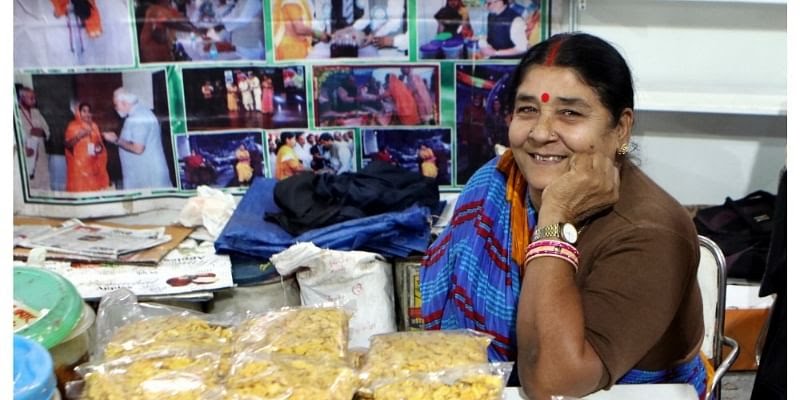Clad in a beautiful simple saree, wearing a big bindi on her forehead, she travels on her bicycle, carrying a cloth bag on its handle. She talks to people about farming and agricultural practices, highlighting her proficiency in the field, informing them about their farming land and crop quality.
Popularly known as Kisan Chachi or Farmer Aunty in her village, Rajkumari Devi is a self-made farm expert from Muzaffarpur, Bihar. Without any degree in agriculture, this mother of three became an expert in farming with self-education and attaining practical knowledge. Today, she is respected by thousands of people across many villages in Bihar for changing the destiny of her district.

With 30 years of experience in agriculture, she now gives tips and advices on kitchen farming, developing agricultural-based products for business. She also helps more than 300 women by creating their own Self-Help Groups to make them financially independent.
Beginning of the farming journey
Thirty five years ago, Rajkumari was a shy homemaker, married to an unemployed man who resided in a remote village of Anandpur. At that time, she had nothing except an acre of barren land, which she had inherited from her husband’s family. Rajkumari always had a strong will and spirit to make herself and her family better.
One day, in the year 1980, this determined woman picked up a shovel and sickle to aid her husband who used to farm tobacco since many years. In their vicinity, the farmers usually farmed tobacco. Rajkumari would toil the whole farm single-handedly whenever her husband would leave the town to sell the tobacco leaves. That became source point for her to learn lot about farming land.
Exploring more farming options
With passing time, she learned that there are more opportunities and they can also grow fruits and vegetables. “Over time, I understood my farmstead so well that I knew what to grow where. So I divided the land into plots and began to grow vegetables and fruits instead of tobacco,” she says.
Initially, people didn’t accept the change easily and even mother-nature was cruel. Her farm, which she had built over a year of time, was destroyed by the floods. But Rajkumari did not quit. She struggled and persevered through the tough times. She began farming paddy and wheat in the low-lying fields and track of bananas, papaya, and mango in the remaining farmland.
“I am no scientist. But over the years, I have come to know the soil of this area well. I might not be 100 percent right always, but I do know what can grow in this region.”
She was busy turning her tobacco farm into something more and the villagers, mostly women, watched her work very hard. Gradually, her farm began flourishing and her neighbors imitated her farming acts. Rajkumari began sharing her expertise with the villagers. She also aided to form Self Help Groups at her vicinity.
Teaching farming through SHG
Many inspired women across her village have formed 35 SHGs in a group of 10 each. Their primary working interest is integrated farming and agri-business. They get monetary funds to run agriculture from government support Swayam Rozgar Yojna and bank loans. “We were simple housewives until Kisan Chachi taught us how to grow vegetables and fruits. We are now self-reliant and can earn up to Rs 3,000 a month,” says Meera Devi, a villager, to Business Line.
Manju Devi says, “Life has changed here. Women have started earning. It is true that we were only experts in household chores but now we also sell our home-made products in the market.” Moreover, with government’s financial aid and easily available low-interest bank loans, various members of SHGs are also getting into fish farming, poultry and cow breeding too.
As of today, there are no barren lands on the blocks of Saraiya. Various renewable crops are cultivated and rotated with seasonal crops for betterment of both yields and soil recycle purpose.
Empowering women
Rajkumari has also formed a non-profit organization, which helps to pick fresh products from the SHGs farms and also hires women to make agriculture-based products.
A few years back, Bihar Chief Minister Nitish Kumar paid a visit to Rajkumari’s village and felicitated her with Kisan Shree Award. When the CM asked her what she wanted, Rajkumari said, “All I want is that our backward district be less afflicted by the devastating annual floods.”
For her, the well-being of the people of her district is top priority. Long back, people of Anandpur and nineteen other villages in Saraiya and Manikpur could even think that they would revolutionize the whole farming patterns.

Initially, the villagers were just growing paddy, wheat and tobacco and were satisfied by it too. As of now, the women from villages of Pipra, Manikpur, Basochak, Saraiya, and Karhara panchayats have wholeheartedly took Kisan Chachi way of agriculture.
Rajkumari is inspiring many women who now look up to her as their role model. Manju Devi, who is the key person for Manikpur Gram Panchayat, says, “Kisan Chachi has done a lot for all of us. She is a real role model.”
If you like this story, share it and spread positivity. Tell us your views by writing in the comment box below. We read each one of them.
Looking For Startup Consultants ?
Call Pursho @ 0731-6725516
Telegram Group One Must Follow :
For Startups: https://t.me/daily_business_reads







